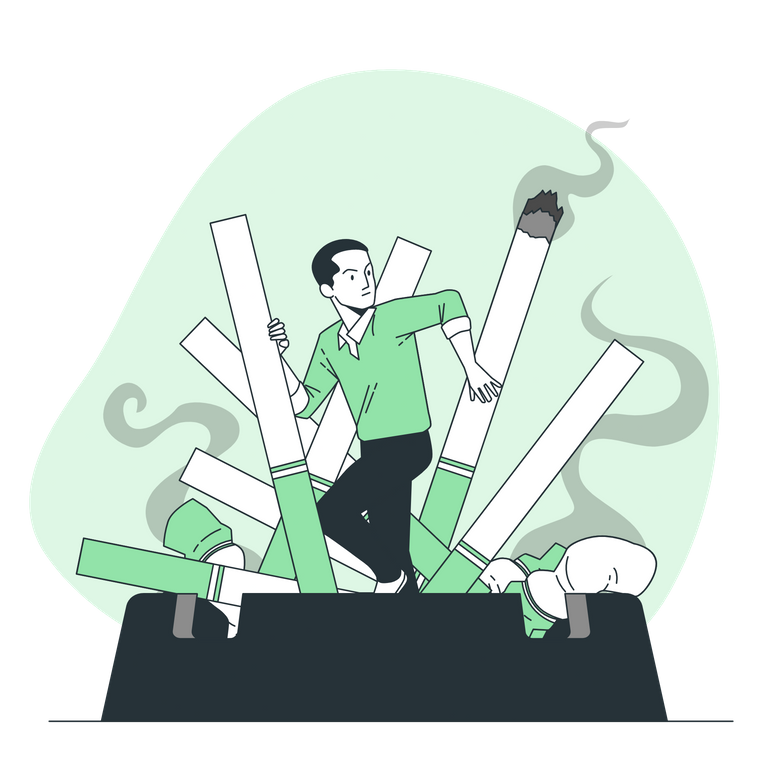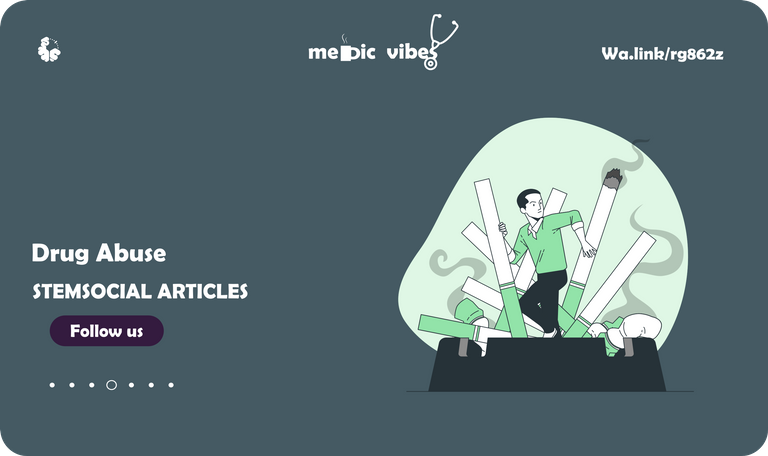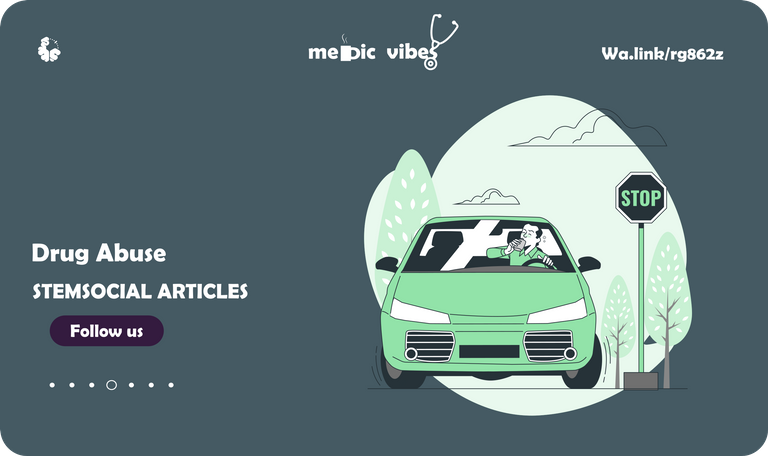Substance Abuse in Nigeria(Results 2)
In the last post, we saw how:
- Different substance abuse treatments vary in effectiveness and are not standardized.
- Drug abuse study finds high prevalence in high school and university students, mostly due to curiosity and ease of access
- Genetics and neurotransmitters play important role in substance abuse and dependence, recent studies use new technology to understand mechanisms.
Welcome to Medic Vibes, where we discuss mental health disorders and make sense of them. Dr Ebingo Kigigha is a medical doctor (aspiring psychiatrist) and creative person (illustration and music). This has been our routine for four consecutive months. This month will be dedicated to substance abuse. In the first month, we discussed Depression, and in the subsequent month, anxiety. We just finished with Conduct disorders.
In this post, we are looking at A Nigerian Study on Substance Abuse. To learn more just keep scrolling down. You can also skip to the key point of the post if you which or go to the conclusion to get the summary.

There are other conditions that those who abuse drugs suffer from. They usually present to the hospital with complaints of substance dependence, but it has been found that almost half of them have one psychiatric disorder or the other. Among them, those who seek help more actively are those who use opioids, cocaine, and alcohol, but those who abuse other drugs don’t usually have people who encourage them to do so and don’t actively seek help.
Two studies have shown that even those that are not diagnosable for abuse, dependence or addiction also tend to have some other psychiatric condition.
In many studies, they have found that around 50% of those who meet criteria for substance abuse or dependence also meet criteria for antisocial personality disorder. It is worth noting even when you consider that the behavior started after using the substance.
Those who have antisocial behavior are more likely to abuse other substances and develop other psychopathology. They tend to derive less life satisfaction, have impulsive thoughts, separate themselves from everyone, and suffer from depression.
Features of depression and tend to be more common in those who abuse substances and are dependent. About 33% of those who abuse opioids or are dependent and two fifth of those who use alcohol meet the diagnosis for depression. One of the major causes of suicide is substance abuse. The risk of suicide is 20 times more for those who abuse substances.
3 out of 20 of those who abuse alcohol or are dependent on alcohol are at risk of committing suicide and is the second largest risk factor to suicide after depression.

Substance Abuse in Nigeria(Results 2)

Image by storyset on Freepik
Out of the 30 studies that were examined, 19 of them focused on the risk of drug abuse. One major factor identified in these studies was the role of sex, with males being more likely to engage in drug abuse. Other factors that played a role included youthful age, financial status, work status, family structure, educational status, and group behavior.
Younger individuals (under 35 years old) were found to be more likely to abuse drugs compared to other age groups. This is particularly true for undergraduate students and high school students, with some studies finding that as many as half of hospital admissions for drug abuse were from high school students. This highlights the high rate of drug abuse among this population and highlights the importance of educating them on the dangers of drug abuse.
Inadequate education on drug abuse is also a problem, with as many as 60% of students not being adequately informed and 73% of teachers admitting that their curriculum did not include any information on drug abuse.
Family background was also found to be a risk factor for drug abuse, with those from polygamous or broken families, or those with parents who use drugs, being more likely to have children and adolescents who abuse drugs. These children are often school dropouts who engage in substance abuse.
Another pointer to the likelihood of drug abuse is having friends who also abuse drugs, as peers who are involved in drug abuse can have a major influence on the drug abuser and can form a loop of enablement. However, religion was found to have a protective effect, with more conservative religious individuals and drivers being less likely to partake in such activities. The importance of educating drivers on drug abuse is also highlighted by Nigeria's RTA data.
Of the studies, 3 of them were done in psychiatric inpatient populations in different regions of the country. The reasons for the admissions were mostly due to psychotic episodes, anxiety symptoms, schizophrenia, and delusional states. No suicide was noted in any of the studies.

Treatment
The treatment for substance abuse is not constant and is not a one-size-fits-all. The methods used for illegal drugs are not the same as those that are available legally. The addictive patterns seen in these patients take a while before change is noted and it happens in stages.
There are five stages in this treatment that have been noted. These are precontemplation, contemplation, preparation, action, and maintenance.
In a few types of addiction cases, there is a need for therapeutic alliance to be directed to the patients' specific stages.
There are some specific drugs that are used for some drug addictions. For alcohol addiction, disulfiram and naltrexone are effective treatment choices. For heroin, methadone or acetate can be used.
For tobacco, nicotine and bupropion have been found to be effective. Some treatment choices are not effective for certain medications. For adolescents and young adults, treatment in facilities has been found to be effective, while some workplaces or professions rely on punishment to prevent recurring expressions, while religious redication has also been effective in dealing with these symptoms.
In many studies, intervention was shown to be an effective means of dealing with this condition, but in some studies, particularly for opiates, it was not effective.
For patients who are exhibiting antisocial behavior or other psychiatric features, they may need close to three months for cocaine or heroin dependence. It is worth noting that even though they may see results in the weeks and days following the treatment, they often will still drop out of the treatment.
Questions
- What did you learn about Substance abuse?
Conclusion
- Studies show risk of drug abuse higher among males, younger individuals, and those with certain family backgrounds or friends who abuse drugs.
- Drug abuse linked to psychiatric disorders, antisocial behavior, depression, suicide.
- Treatment for substance abuse varies and includes stages, specific drugs, and therapeutic alliance.

References
- Kaplan-Sadocks-Comprehensive-Textbook-Psychiatry
- Page demarcations made with Inkscape.org
- Healthline
- NIMH
- WHO


Substance abuse is really on the high, some young people are so addicted to these substances that they could go crazy without it, I saw a guy who was literally shaky when he didn't get the substance within an hour of demand. There are agencies in place that could help with this process and I feel a lot is being done in this regard.
It really is a problem...and the truth is we only have a rough estimate of what is really going on in Nigeria. I hope the person can get the help the person needs.
Thanks for your contribution to the STEMsocial community. Feel free to join us on discord to get to know the rest of us!
Please consider delegating to the @stemsocial account (85% of the curation rewards are returned).
You may also include @stemsocial as a beneficiary of the rewards of this post to get a stronger support.